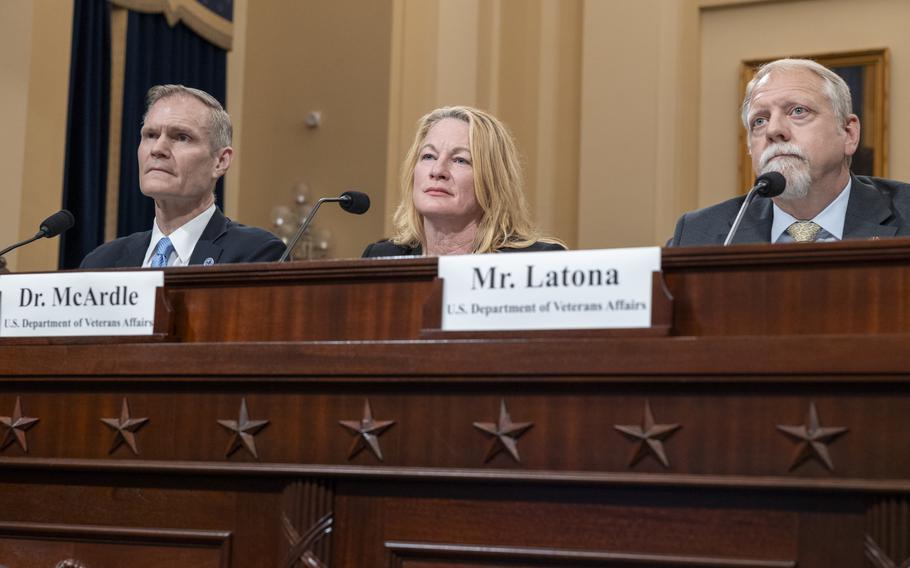
From left, Joel Scholten, executive director of Physical Medicine and Rehabilitation Service, Department of Veterans Affairs; Rachel McArdle, deputy executive director of Rehabilitative and Prosthetic Services at the Veterans Health Administration; and Jason Latona, assistant director for loan guaranty service at the VA, testify at a House Veterans' Affairs subcommitte on economic opportunity Wednesday, May 21, 2025, in Washington. (Eric Kayne/Stars and Stripes)
WASHINGTON — Veterans advocacy groups warned lawmakers that payment delays to vendors and staff cuts at the Department of Veterans Affairs are creating delays and barriers for individuals with disabilities trying to modify their homes and vehicles with specialized equipment.
Julie Howell, associate legislative director of Paralyzed Veterans of America, told lawmakers at an oversight hearing of the House Veterans’ Affairs subcommittee on economic opportunity that larger caseloads at the VA have effectively ended in-person inspections of modified homes for veterans with disabilities. Instead, many of the reviews are done virtually.
Howell and other advocates for disabled veterans also cited chronic payment delays of six months or more by the VA when veterans try to purchase vehicles with special equipment, such as mechanical hand controls and wheelchair tie-downs.
The hearing Wednesday was a review of VA’s adaptive programs for disabled veterans. Rep. Chris Pappas, D-N.H., emphasized the importance of VA providing the benefits and services that veterans with catastrophic injuries and terminal illnesses require to safely live in their homes and use their personal vehicles.
Rachel McArdle, deputy executive director of Rehabilitative and Prosthetic Services at the Veterans Health Administration, said the specialty adaptive housing program has approved more than 2,000 grants annually for the past six or seven years.
The VA recently initiated a process to automate the grants program, from application to compliance inspection upon completion.

Julie Howell, associate legislative director of Paralyzed Veterans of America, testifies at a House Veterans’ Affairs Subcommittee on economic opportunity hearing on Wednesday, May 21, 2025, in Washington. (Eric Kayne/Stars and Stripes)
But Howell said many of the paralyzed veterans who use the service believe a shift to virtual reviews is not as effective as a walk-through of a home.
“This leaves a lot of room for errors and mistakes, and therefore begs the question: Who will be responsible for subpar construction or inappropriate materials when remote inspections are the only option?” Howell said.
Under the adaptive housing program, veterans with severe disabilities receive VA assistance for remodeling and construction. That may range from wheelchair ramps to changes to bathrooms and kitchens to improve accessibility.
Howell also said that the VA grants for veterans to make minor home adjustments have not increased since 2010. She said two pieces of legislation before Congress would raise the amount and enable grant amounts to change with inflation.
“The special adaptive housing program plays an important role in providing customizable adaptations for severely service-connected disabled veterans to adapt their homes to make them more accessible to lead their lives comfortably,” said Rep. Derrick Van Orden, R-Wis., subcommittee chairman.
“Our wounded veterans are trapped in chairs for the rest of their lives. All of this is about them,” Van Orden said.
The VA also provides benefits for modifying vehicles, such as adding mechanical hand controls and wheelchair tie-downs. The VA works with vendors that provide and install adaptive equipment.
But Rep. Tom Barrett, R-Mich., asked about reports of VA payment delays of six months to a year to the vendors who provide adaptive equipment for automobiles.
Jason Latona, assistant director for loan guaranty service at the VA, said the process is not centralized. Local VA offices handle the payments, and the agency is looking into complaints of bottlenecks and delays at some offices.

Craig Schrimsher, president of North American Manufacturing at BraunAbility, testifies at a House Veterans’ Affairs Subcommittee on economic opportunity hearing on Wednesday, May 21, 2025, in Washington. (Eric Kayne/Stars and Stripes)
Craig Schrimsher, president of North American Manufacturing at BraunAbility, which builds wheelchair-accessible vans, cited delays averaging 186 days to vendors when the expectation is for payment upon delivery of the modified vehicle.
Schrimsher described a “lack of empathy and dismissive attitudes” by VA staff to the disabled veterans. “They are making life more complicated and expensive” for the veteran, he said.
Van Orden and other committee members suggested there needs to be more oversight and a consistent approach to VA’s management of the program.
“My veterans are not beggars and should not be treated as such,” Van Orden said.